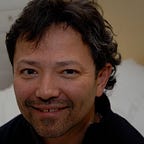Authenticity, Meaning and Values 1
Existence as Process: Authenticity
To understand existence as a process of becoming we need to explore the relationship between authenticity, meaning and values.
Heidegger’s Authenticity
Taking a closer look at Heidegger’s notion of authenticity first, it is clear we are not talking about a process of discovering the true self, that is somehow deeply embedded within us.
For Heidegger, authenticity is an attitude in which one engages in projects that result in constructing oneself, creating a narrative for one’s self.
The self is a “relation of being,” a relation between what one is at any moment, the concrete present, and what one can be, as that temporally unfolds to an open realm of possibilities.
In living out our lives, we care about who and what we have become. Our being is what we think our lives will amount to and is always at issue.
“Being at stake” or “being in question for oneself” is made concrete in our views, the roles we perform, our actions, over the course of our lives.
In life, we are simultaneously thrown into the world, and creating our being through our projects.
The self is a construction over time in a social context, and engaging in activities authentically is not being true to a pre-given nature, but being a person who acts through virtues such perseverance, integrity, clear-sightedness, flexibility, openness, and resilience.
Taylor’s Authenticity
The concept of authenticity has come under criticism as devolving into nothing more than self-centeredness, narcissism, self-indulgence and self-absorbed behavior.
Proponents of this view of authenticity see it as having the effect of being anti-social, anti-empathetic, of having no ground in an objective morality and a duty of care for others.
Philosopher Charles Taylor has more recently defended the concept of authenticity as more than self-indulgence. In Sources of the Self and The Ethics of Authenticity, Taylor posits that human beings are inherently self-interpreting; constantly turning inward to understand ourselves and create a vision for ourselves.
But in so doing, Taylor argues, we also turn upward, we seek out meaning in the context of a common language and a social intersubjectivity.
He identifies a “triumph of the therapeutic” as that which creates a hedonism of authenticity, and argues instead for a thick notion of authenticity that is informed by some sense of the good.
Not a Transcendent Subject
Taylor’s self is not the objective transcendent subject of the Enlightenment. Taylor’s self is constructed, but in a personal and social context.
We have the freedom to explore and experiment authentically with moral sources, visions of the good, and authentically search for that which personally resonates within, provides us with meaning and value, and enables us to discover or rediscover our own enchantment with the world.
But we do this in the context of a shared language and sources of the good that are available to us in a social and historical setting.
Taylor asserts that it is in this manner that we act authentically: through deep internal engagement in aid of the construction of a self, but a turn inward that takes us beyond the self, and sometimes leads “to a fragmentation of experience that calls our ordinary notions of identity into question.”
In this sense, authenticity requires maintaining bonds to collective questions of worth that point beyond our own preferences, and making “strong evaluations” of questions of worth.
I hope you enjoyed this article. Thanks for reading!
Tomas
Please join my email list here or email me at tomas@tomasbyrne.com.
Excerpt from my forthcoming book, Becoming: A Life of Pure Difference (Gilles Deleuze and the Philosophy of the New) Copyright © 2022 by Tomas Byrne. Learn more here.
